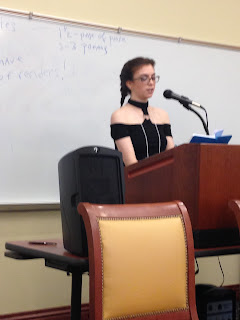Hello and welcome to the last day of the 20th Annual West Virginia Writers’ Workshop. We all came to Colson 130 at 9:30AM for our Panel on Publishing, with all of our Workshop Faculty. This is always a fun morning, because we’re able to talk about what we can do with all of the writing that we have generated over the last three days (and that we got to enjoy last night at the Open Mic at Mother India).
Publishing panels can show us both sides of the literary arts. David Hassler and Jacinda Townsend talked more about the nitty gritty business side of what it means to be a writer, what it means to labor over revisions, and how to stay in the game even through all of the rejections that we will inevitably experience, while Shara McCallum talked about how the spirit of our creative desires should fuel and sustain us, because we love it. As I was having lunch with Natalie and Renee earlier, I realized that our Workshop has both of those elements. Each year we bring amazing authors to come in and be part of our Workshop Faculty, which is a very businesslike endeavor. But all of the authors come to do work and pay homage to the craft of writing, which supports and sustains and fulfills us. Each year, the Workshop is a labor of love. And twenty years in, it’s still the most magical weekend in July.
These are Mark's Thank-You's to:
all of you in the Department of English...and...
To our participants -- who came from Iowa, Louisiana, Maryland, Ohio, New York, North Carolina, Pennsylvania, Virginia, and the great state of West Virginia
To Jim Harms -- whose wonderful concluding poem Friday night now makes me think of our local diner as the "Existentialist Cafe, with Milkshake"
To Marsha Bissett -- whose management skills are second only to her grace under pressure
To Cindy Ulrich -- who handles so much so effortlessly
To Ethel Morgan Smith -- whose reading was topped only by the stunningly moving panel she served on
To Breon Batten, Kelly Johnson, and Amanda Tustin -- muchisimas gracias!
To our amazing Workshop faculty, who came from far (Jacinda Townsend, who is heading out for a teaching position in California) and near (relatively, in some cases; very in others): Dominique Bruno (social-media maestro extraordinaire), Ann Claycomb, David Hassler, Brent House, Alonzo LaMont, Shara McCallum, and Howard Owen
To Natalie Sypolt, who displayed her usual firm patience with (and inspired) 16 high-school participants
To Bonnie Thibodeau, who had the night-shift with the high-schoolers and lived to tell the tale
To our grad-student and undergraduate-student assistants: Megan Fahey, Bryce Berkowitz, Jordan Carter, and Amanda Gaines
To our dean, Greg Dunaway, whose enthusiastic support of the Workshop justly received enthusiastic applause from our participants and faculty Friday night
To our president, Gordon Gee, who has talked up our Workshop frequently ever since his welcome (second) arrival at WVU
To the WVU bookstore, which came through
And of course to Renée Nicholson, whose commitment to the Workshop is unrivaled and deeply, deeply appreciated.
If I missed anyone -- please accept my absent-minded (but grateful) thank you!
Planning for next year's West Virginia Writers' Workshop is already under way. We hope to see you there!
In the meantime, be sure to "Like" and follow us on Facebook: @WVWritersWS
On Twitter: @WV_Workshop
And on Instagram: wv_writersworkshop
The hashtag that Renée came up with is #wvww20 for our 20th Anniversary. You can do a search for that on Facebook, Twitter, and Instagram to re-live your favorite moments!
Thank you thank you thank you to all of the Workshop participants this year, and over the last twenty years. Doing the social media for this Workshop is the highlight of my summer, and I love every minute of it.
'Until next year Tenants-
Dominique

























